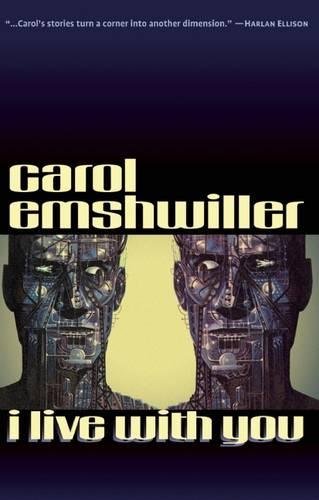Carol Emshwiller’s collection I Live with You takes its title from one of its stories, “I Live with You and You Don’t Know It.” That “You” is an unnamed everywoman who spends too much time at whatever pointless job she’s given up to, comes home to a too-big house, empty save for the inevitable housecat. She could be anybody, me or, well, you. More interesting is the identity of the house’s newly arrived third occupant—that equally inscrutable “I”—a succubus-type of indiscriminate nature who goes unnoticed or at least unacknowledged. “I nibble at your food,” she taunts. “I nap in your bed when you’re at work and leave it rumpled. You thought you had made it first thing in the morning and you had.”
The appeal of “I Live with You” (and, for that matter, of I Live with You) is that none of this seems odd until you’ve left it alone for a while, abandoned the carefully and invisibly drawn completeness of this context for the reality you’ve created for yourself. While inside, though, your attention isn’t drawn toward where it normally would be—that woman, so all-encompassing that you’re bound to find yourself somewhere inside her—but rather toward her shadow. What is she? you’ll wonder later: some kind of mythological fantasy, or a ghastly/ghostly ex-person, or a once-normal driven somehow weird? But What? is beside the point, subordinate to Why?
These stories all seem slightly off, an angled aspect of the common, or a perfect portrait of the unusual. Spending too much time with any one could easily turn disorienting. The repetition of themes (men are just boys in adult drag, the extraordinary are routinely subsumed by the overwhelming average, war is ultimately and inevitably fruitless) and motifs can be literally dizzying: more than once, you might find yourself flipping through the book as if you’d unwittingly stumbled backward, wondering if you’ve already read a particular part or whole of a particular tale, and if so, how many times. To Emshwiller’s credit, this is more intoxicating than frustrating. These pieces collude and collide, retracing one another’s steps—“The Library” is about knowledge and warfare, “Boys” is about warfare and gender, “Coo People” is about gender and knowledge—creating a web of Venn diagrams presumably the size and shape of the author’s intentions.
You’ll find I Live with You, along with Emshwiller’s others, in your bookstore’s Science Fiction section;...
You have reached your article limit
Sign up for a digital subscription and continue reading all new issues, plus our entire archives, for just $1.50/month.
Already a subscriber? Sign in





